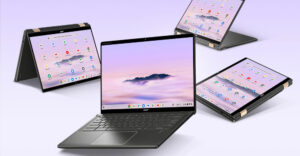
HP yesterday announced it has teamed with AMD to address the fast-growing small and mid-size business (SMB) mobile market. The computer maker introduced the 2.4-pound HP Compaq nx6125 Notebook PC, which incorporates AMD Turion 64 mobile technology and includes biometric security features.
IDC vice president Roger Kay told TechNewsWorld that HP has long promoted AMD, not only with its consumer lines but also with occasional commercial clients — usually small businesses. “This is the first time AMD has had a big company win for the Turion and for them that’s a big deal,” he said. “But HP is doing its best to be platform-agnostic and promote both Intel and AMD.”
Targeting SMBs
HP is doing its best to target SMBs. According to a small business survey commissioned by HP and conducted by Harris Interactive in March, 36 percent of small business owners surveyed plan to incorporate notebooks as part of their technology suite within the next year and 35 percent of small businesses surveyed think notebooks help them stay competitive with larger companies.
In addition, IDC recently reported SMB notebook growth at 24 percent year-over-year for the first quarter of 2005.
“Small and mid-size businesses are clearly the sweet spot within the mobile market and being untethered from the office provides a competitive advantage by enabling workers to access critical business information when and where they need it,” said Kevin Gilroy, worldwide senior vice president and general manager, Small and Medium Business, HP.
Next-Generation Security Features
The introduction of the nx6125 marks the 11th new business notebook the company has introduced in the last 140 days. The nx6125 offers a built-in HP Biometric Fingerprint Sensor providing customers with authentication that is more secure than passwords alone.
HP ProtectTools also includes an optional integrated Smart Card Reader, while HP Credential Manager increases network security by providing a secured, single sign-on password solution so users do not have to remember multiple, complex passwords.
Kay said featuring biometric readers on computers is an up and coming trend made possible by the Trusted Platform Module (TPM) design specification authored by the Trusted Computing Group, an industry consortium that develops and promotes open specifications to protect and strengthen computer platforms against software-based attacks.
“Essentially all the top computer makers have adopted TPM as the best security device for the computer,” Kay said. “One of the important aspects of that is the ability to hook it to a fingerprint reader. While the attach rate for fingerprint readers is fairly low today — about 25 percent to 35 percent — I believe it’s going to rise.”
The Rise of TPM
TPM use is already rising. IDC estimates there were about 7 million TPM units on the market last year. That number is expected to jump to 20 million this year and to more than 200 million in the next four years. That’s important to Microsoft, which has built its Longhorn security structure on TPM.
The fingerprint reader ties the user to the machine. Then the TPM ties the machine and the user to the network. A trusted network server can authenticate the fingerprint, the machine, and then ensure the machine is compliant with security policies, like virus patches and firewall updates, before allowing the user access to the network.
“This goes way beyond the individual platform level and into entire network infrastructure,” Kay said. “This is a huge development that’s coming slowly, but adoption is roaring along as we go.”





















































Is facial recognition biometrics being considered? It has features that can’t be used with fingerprint.
I use FRS myself and it is the greatest sense of security possible. If I’m not in front of my computer, it logs me off and stays off untill I return. Logon process requires no further action on my part and takes only seconds.